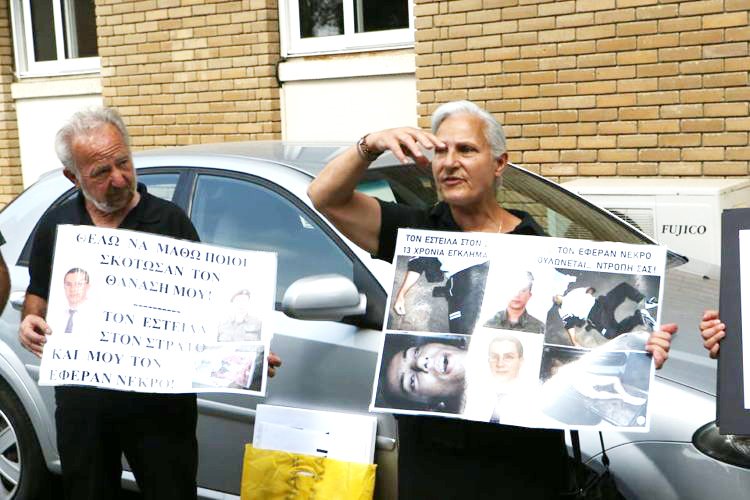Following the attorney-general’s announcement that no evidence of criminal wrongdoing has come up in the case of the 2005 death of national guardsman Thanasis Nicolaou, his mother Andriana said they would take the case to the European Court of Human Rights.
“An obvious crime has been covered up,” she said, expressing her disappointment and frustration with the legal service and the attorney-general’s office.
She confirmed her intention to take the case to the European Court of Human Rights (ECHR).
“Having been brought to this point, we have no choice but to pursue private criminal prosecutions. If there is any alternative solution to this, I ask the state to duly inform us,” she said.
Nicolaou’s mother also took a dig at attorney-general Giorgos Savvides, quipping that his office did not do enough to shed light on the case.
“Those who should have done what needed to be done have washed their hands and granted absolution to both the murderers and those who failed to do their job correctly (the investigators).”
Moreover, she questioned how a crime could remain unsolved for as many years as the one involving her late son has been.
“The struggle is not just mine; it is everyone’s struggle, since this country has been tainted by corruption.
Following the attorney-general’s announcement that no evidence of criminal wrongdoing has emerged in the case of the 2005 death of national guardsman Thanasis Nicolaou, his mother Andriana said they would take the case to the European Court of human rights.
In a social media post, Nicolaou’s mother lashed out against the legal service.
“We have been waiting to get a response from the attorney-general’s office for 50 days in order to get answers on how we proceed with a tragic case that has been tormenting us and making us suffer unimaginably for 18 whole years, just because corrupt individuals covered it up,” the post said.
“The letter we received saying that there will be no prosecutions in the case speaks volumes of the cover-up and proves that my son was killed because he witnessed drug dealings at the camp he was stationed.”
Earlier on Wednesday, the family’s lawyer Chris Triantafyllides said that the family intends to open legal proceedings “against those tasked with the investigation of the guardsman’s death, such as investigators Savvas Matsas and Antonis Alexandropoulos, and against three police officers serving at the Limassol police headquarters in Limassol at the time of Nicolaou’s death.”
The lawyer also said that positive developments are also expected in the lawsuit filed by the family against the Republic for the flawed investigation of the case.
According to Triantafyllides, it is possible that attorney-general Savvides will accept a settlement based on the decisions of the ECHR and cover the family’s legal expenses, as well as any compensations that may be awarded.
He also underlined that, despite Savvides’ failure to find any criminal wrongdoing in the case, the family is still cooperating with the attorney-general’s office.
Later in the day, CyBC reported that President Nikos Christodoulides contacted Thanasis’ mother and told her that the state would cover legal fees to take the case up in private courts.
On Tuesday, Savvides said the current leadership of the attorney-general’s office did all it could – and under the difficult conditions of investigating the event 18 years later – to get to the bottom of the circumstances surrounding the death of Nicolaou and, if possible, identify any culprits.
According to Savvides, his office appointed the criminal investigators which the Nicolaou family wanted, gave them the extensions they wanted, and when the investigators reported that they did all they could and it was now up to the police to pursue further, he personally instructed that a special team be established consisting of police officers who had no previous ties to the case.
This team, Savvides said, were given a timeframe to investigate and to clear up any ‘gray areas’.
Government spokesperson Konstantinos Letymbiotis also commented on the decision of the attorney-general’s office.
Asked by journalists after the cabinet meeting what Christodoulides believes regarding the case, Letymbiotis said the legal service and the attorney-general “operate in complete autonomy and independence”.
“We are talking about a tragedy. Only the family knows what they have been through for the past 18 years,” he said.
“At the same time, however, the attorney-general’s office and the legal service are independent institutions and we cannot intervene in their decisions with our own opinions.”
In 2005 Nicolaou’s body was found under a bridge in Alassa; police and the army at the time ruled his death as a suicide.
But after his remains were exhumed two years ago over suspicions of foul play, further autopsies showed he had been beaten and strangled.
One of the investigators tasked with carrying out the third inquiry into his death said last year that criminal acts had been committed.
That raised questions, such as if a Greek pathologist found evidence of strangulation 15 years later, how did a Cypriot pathologist not find the same within hours of the guardsman’s body being discovered.
In April this year, a glimmer of hope appeared to be opening up for Nicolaou’s mother – who has been demanding justice since his death – when the attorney-general’s office handed over the material of police investigations which it had previously refused to.
The family has a pending lawsuit against the Republic of Cyprus for damages in connection with an alleged incomplete investigation and human rights violations at the Nicosia district court.







Click here to change your cookie preferences